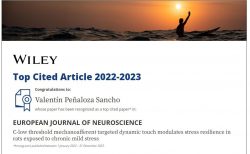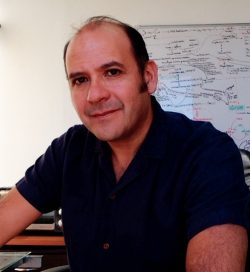CIESAL researcher is the author of one of the most cited articles in the prestigious Wiley publishing house
22/05/2024Research on stress resilience in rodents is starting to be replicated in humans

John Wiley & Sons – one of the world’s leading scientific publishers – recently highlighted the article ‘C-low threshold mechano-afferent targeted dynamic touch modulates stress resilience in rats exposed to chronic mild stress’ as one of the most cited articles in the European Journal of Neuroscience, 2022-2023.
The main author of the aforementioned publication is Alexies Dagnino, PhD in Biomedical Sciences from the University of Chile, full professor at the Institute of Physiology of the Faculty of Sciences of the UV, recently incorporated as a researcher at CIESAL with the aim of strengthening the mental health team and the interdisciplinary perspective of the Centre. Professor Dagnino has dedicated his professional life to the study and understanding of how chronic exposure to stressful circumstances affects the brain and the organism as a whole and those life experiences that promote stress-coping strategies.
The study highlighted by Wiley publishers–conducted in rodents–is pioneering in demonstrating the possible use of sensory systems to modulate resilience, i.e. our ability to adapt quickly and positively to stressful situations.

Alexies Dagnino, PhD in Biomedical Sciences
Enhancing resilience by stimulating nerve fibres in the skin
According to Professor Dagnino, these findings are of radical importance, ‘because when the brain loses its capacity for resilience to stress it becomes more vulnerable to stress-related mental illnesses such as depression and anxiety disorders’. The study showed that by stimulating receptors located on nerve fibres in the skin–called ‘CLTMs’–it is possible to improve stress resilience in rodents.
The research has opened the door for this idea to be tested in humans and its effects on mental health to be observed. This is why it is currently being replicated in humans, within the framework of a project financed by the company Chanel, in Sweden, where the researcher Dagnino participates as a consultant.
Asked about the impact of research in this area on people’s quality of life, the researcher recalled that “mental illnesses have a high social and economic impact on the population and affect many people, so if we can increase our resilience we will be less likely to develop mental illnesses, or we can improve our brain’s response to current treatments for these illnesses.”



